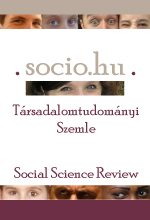Fortélyos félelmek
Cunning fears
The sociocultural and ideological embeddedness of negative intergroup attitudes
Author(s): Róbert TardosSubject(s): Social psychology and group interaction, Migration Studies, Social Norms / Social Control, Identity of Collectives
Published by: MTA TK Szociológiai Intézet
Keywords: intergroup attitudes; outgroup/ingroup focus; refugee crisis; negative ties; two-mode net-work
Summary/Abstract: The recent years have witnessed a rapid surge in the problem of migration on the public agenda in Hungary and on a larger international plane as well. Research is prompted to go into deeper layers of attitudes and rethink their rearrangements in various respects. The paper is based on a survey from the Spring of 2014 by the MTA – ELTE Peripato Research Group containing a module on immigration and attitudes, as well as stereotypes toward foreigners. Though the field work took place prior to the larger waves of refugee crisis, the module and a further array of questionnaire blocks on various public issues enables a comprehensive look into the respective patterns of thinking. The findings confirm the assumption of separate syndromes of outgroup- and ingroup foci; a dual scheme not quite ubiquitous in the literature given the general conception of the (negative/positive) reciprocity of outgroup- and ingroup ties. A fourfold typology is furthermore added to these two dimensions resulting in two congruent types in terms of inclusion/exclusion on the ideological poles and two, more sizable ones incoherent in the sense of a theoretical constraint, following other types of everyday logics on their own (related to general confidence or ressentiment). Analyses display partially different sets of sociodemographic and cultural-ideological backgrounds regarding the ingroup and outgroup axes of attitudes and the ideologically coherent and incongruous sub-populations, with regional-contextual characteristics, levels and dynamics of economic resources and ideological-political axes figuring among key influences. A two-mode network approach based on a semantic web with nodes of intergroup attitudes on the one hand, and poles of three (left/right, liberal/conservative, moderate/radical) ideological dimensions on the other, adds to the picture with special regard to the place of migration attitudes in the landscape of public thought.
Journal: Socio.hu Társadalomtudományi Szemle
- Issue Year: 6/2016
- Issue No: 2
- Page Range: 61-88
- Page Count: 28
- Language: Hungarian

